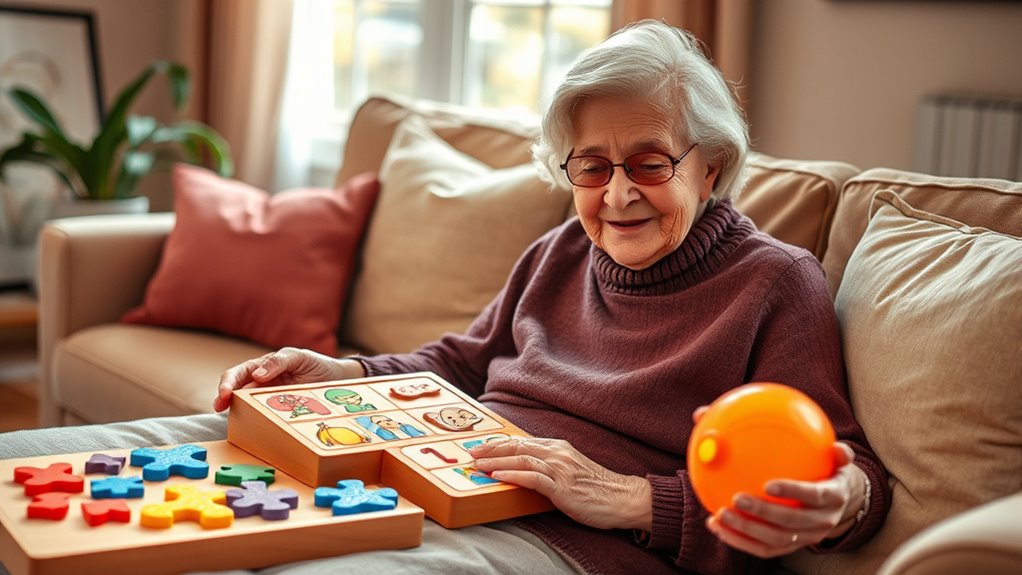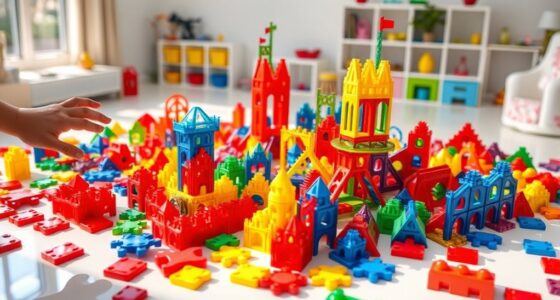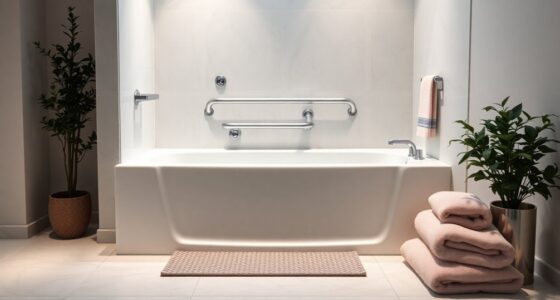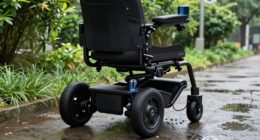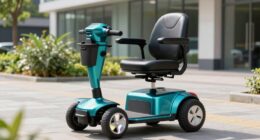I’ve found that the best gaming and activity aids for Alzheimer’s patients combine tactile stimulation, puzzles, memory games, and sensory tools to boost engagement and memory. Items like fidget blankets, textured toys, large-piece puzzles, and conversation cards help promote cognitive skills while providing comfort. These tools support fine motor skills, reduce anxiety, and encourage social interaction. If you keep exploring, I’ll show you some top picks that can truly make a difference in daily life.
Key Takeaways
- Incorporate tactile tools like textured wristbands and sensory aids to stimulate nerve receptors and enhance engagement.
- Use large-print activity books and puzzles to support cognitive function and improve memory retention.
- Include multi-sensory fidget blankets and calming toys to reduce agitation and promote relaxation.
- Select durable, easy-to-handle items with adjustable difficulty levels to accommodate varying cognitive abilities.
- Combine visual, tactile, and auditory features to maximize sensory stimulation and foster social interaction.
Fidget Blanket for Adults with Dementia
The Fidget Blanket for Adults with Dementia is an excellent choice for seniors who need a calming, engaging activity to reduce anxiety and agitation. We love how it combines 13 sensory items that stimulate touch and focus, helping to keep restless hands busy. Its portable size makes it easy to use at home, in care facilities, or during travel. Designed to promote relaxation and improve fine motor skills, this blanket offers a safe, soothing outlet for sensory development. Whether for dementia, autism, or other sensory needs, it’s a practical tool that encourages calmness and mental engagement in various settings.
Best For: seniors with dementia, Alzheimer’s, autism, or sensory needs seeking a calming, engaging activity to reduce anxiety and promote relaxation.
Pros:
- Includes 13 sensory items to stimulate touch and focus.
- Portable design with handles for easy transport and storage.
- Supports fine motor skills and sensory development in various settings.
Cons:
- May require occasional cleaning to maintain hygiene.
- Some users might find certain sensory items less engaging over time.
- Not suitable for individuals with severe tactile sensitivities or allergies to materials used.
Fidget Blanket for Adults with Dementia
A fidget blanket for adults with dementia is an excellent choice for caregivers seeking a calming, interactive tool to engage their loved ones. It features colorful activities and sensory textures designed to meet sensory needs while reducing boredom, confusion, and loneliness. This portable, foldable blanket promotes independence, focus, and maintains crucial skills by simulating daily tasks. Made from soft, durable fabric, it withstands daily use and provides comfort. Suitable for various conditions like Alzheimer’s, autism, or anxiety, it’s a thoughtful gift that offers meaningful engagement at home, in care facilities, or on the go. Its multifunctionality makes it an essential sensory aid for many caregivers.
Best For: caregivers and family members seeking a portable, engaging sensory tool to comfort and stimulate adults with dementia, autism, or related conditions.
Pros:
- Promotes independence, focus, and cognitive engagement through interactive activities
- Made from soft, durable fabric designed for long-term daily use
- Compact and foldable with handles, making it easy to carry and use anywhere
Cons:
- May require occasional cleaning to maintain hygiene and appearance
- Some users might need initial guidance to explore all features effectively
- Limited size for very active individuals who prefer larger sensory tools
Alzheimers Activities for Seniors – Memory Training Products
Designed specifically for seniors with memory challenges, the memory training product offers a versatile and engaging way to boost cognitive skills. It includes twenty-four colorful wooden pieces, a dice, and a compact board, making it ideal for both group and solo play. The adjustable difficulty allows us to tailor the activity to each individual’s ability, ensuring continuous mental stimulation. By practicing placement and color recall, users strengthen memory retention. Crafted from durable, safe wood, this product is suitable for homes, nursing homes, or assisted living facilities. It’s a practical, enjoyable tool that encourages family bonding, mental exercise, and cognitive health for seniors facing memory decline.
Best For: seniors with memory challenges, dementia patients, and adults seeking engaging cognitive activities at home or in care facilities.
Pros:
- Enhances memory and cognitive skills through interactive play
- Adjustable difficulty to suit various skill levels and progressions
- Durable, safe wooden construction suitable for frequent use
Cons:
- May require supervision for optimal engagement among some users
- Limited to memory training, potentially less variety in activity types
- Small pieces could pose a choking hazard if not handled carefully
SOFWO Fidget Blanket and Muff for Adults with Dementia
For caregivers seeking a calming, sensory tool for adults with dementia or other neurodivergent conditions, the SOFWO Fidget Blanket and Muff offers an effective solution. This device provides engaging sensory activities that help relax restless hands and stimulate nerve receptors. Its detachable blanket encourages tactile exploration, supporting mental and emotional well-being. Designed for ease of use in care settings, it’s durable, soft, and hand-sewn to guarantee safety. Perfect for nursing homes or as a thoughtful gift, it reduces agitation and promotes calmness, making it a versatile addition to any care routine aimed at enhancing comfort and engagement.
Best For: caregivers and family members seeking a calming, sensory tool to support adults with dementia, Alzheimer’s, autism, or related neurodivergent conditions in care settings or at home.
Pros:
- Provides engaging sensory activities that help reduce agitation and promote relaxation.
- Durable, soft, and hand-sewn for safety and long-lasting use.
- Detachable blanket encourages tactile exploration and easy sharing in care environments.
Cons:
- Hand wash recommended, which may require extra care and time for cleaning.
- Accessories, though sewn securely, may still pose a risk of breakage over extended use.
- Not suitable for machine washing, limiting convenience for some users.
Dementia Therapy Fidget Blanket for Elderly Patients
The Dementia Therapy Fidget Blanket stands out as an excellent tool for caregivers seeking calming activities that address sensory needs and promote motor skill development in elderly patients. Designed specifically for those with dementia, Alzheimer’s, autism, Aspergers, ADHD, and anxiety, it helps reduce memory loss while supporting independence. With diverse textures, buttons, zippers, and threaded cords, it provides tactile engagement that soothes nerves and relieves stress. The blanket also aids in maintaining hand dexterity and joint flexibility, making it a versatile therapeutic tool. Whether for calming or therapy, this fidget blanket offers meaningful engagement for seniors with cognitive and sensory challenges.
Best For: Caregivers and family members seeking calming, sensory-engaging tools to support elderly patients with dementia, Alzheimer’s, autism, Aspergers, ADHD, or anxiety.
Pros:
- Promotes relaxation and stress relief through diverse tactile activities
- Supports hand mobility and dexterity, aiding in maintaining joint flexibility
- Versatile and suitable for therapeutic use, gifts, or everyday calming needs
Cons:
- May require supervision to ensure safety with small fasteners or cords
- Not customizable for individual sensory preferences or specific therapy goals
- Potential for wear and tear over time with frequent use
Sensory Toy Wrist Cuff for Alzheimer and Autism Therapy
Sensory toy wrist cuffs are an excellent choice for individuals with Alzheimer’s, autism, or other neurological conditions because they provide calming tactile stimulation that can reduce anxiety and agitation. These lightweight, portable cuffs keep hands busy with features like buttons, sequins, ribbons, tassels, and beads, all sewn securely to guarantee safety. They stimulate nerve receptors on fingertips, promoting finger, hand, and brain activity, which can improve social behavior and comfort. Easy to wear around the wrist or arm, they offer a simple way to help manage restlessness and promote relaxation, making them a valuable therapeutic tool for daily use.
Best For: individuals with Alzheimer’s, autism, ADHD, or OCD seeking a calming, sensory stimulation tool to reduce anxiety and promote relaxation.
Pros:
- Lightweight, portable, and easy to wear around wrist or arm for convenience and daily use
- Features securely sewn accessories like buttons, sequins, ribbons, and beads for safe, engaging tactile stimulation
- Promotes nerve receptor stimulation, helping improve social behavior and reduce agitation
Cons:
- Limited color and accessory variety may not suit all personal preferences
- May require regular cleaning to maintain hygiene, especially with frequent use
- Some users might find the tactile features overstimulating or distracting in certain environments
Memory Activity Book for Adults
This Memory Activity Book for Adults stands out as an ideal tool for seniors or individuals experiencing early to moderate memory challenges because it offers easy-to-understand exercises designed to stimulate recall without causing frustration. It provides a variety of relaxing activities, puzzles, and brain games that enhance both short-term and long-term memory. Large-print images and simple solutions make it accessible, encouraging engagement and confidence. The themed sections, such as Around the House or Love of Animals, add variety and structure, keeping the mind active and entertained. Overall, this book combines fun and mental stimulation to support cognitive health effectively.
Best For: seniors and individuals with early to moderate memory challenges seeking enjoyable, accessible activities to boost cognitive health.
Pros:
- Large-print images and clear instructions enhance ease of use.
- A variety of activities targeting both short-term and long-term memory.
- Themed sections provide engaging structure and variety to maintain interest.
Cons:
- May be too simple or basic for those seeking more advanced brain training.
- Limited difficulty progression might reduce challenge over time.
- Some users might prefer digital or interactive memory exercises over printed activities.
Dementia Activities for Seniors, Wooden Puzzles & Cognitive Games
When caring for seniors with dementia, engaging activities that promote mental stimulation and support cognitive function are essential. Wooden puzzles and cognitive games designed for seniors help maintain mental agility, reduce feelings of loneliness, and foster problem-solving skills. These puzzles feature 78 difficulty levels, vibrant colors, and are built with durable, adult-sized pieces, making them suitable for various cognitive abilities. Participants follow simple rules, like fitting pieces into a tray or completing patterns, encouraging fine motor skills and memory. Their engaging design makes them perfect gifts for loved ones, providing meaningful entertainment while supporting cognitive health in seniors.
Best For: seniors with dementia or cognitive impairments seeking engaging, stimulating activities to support mental agility and fine motor skills.
Pros:
- Promotes mental engagement and cognitive function through various difficulty levels
- Durable design with vibrant colors enhances visual appeal and interest
- Easy to use, suitable for a wide range of abilities, and makes a thoughtful gift
Cons:
- May require supervision for some users to ensure proper use and safety
- Limited to shape and pattern matching, potentially less engaging for highly advanced individuals
- Packaging discreetly designed without mention of dementia, which might not highlight its specific benefits for caregivers
6 Pack Large Puzzles for Seniors with Storage Bags
Looking for an engaging activity that’s easy to manage and keeps belongings organized? Our 6 Pack Large Puzzles for Seniors with Storage Bags fit the bill perfectly. Each puzzle measures 15 x 10 inches with large, textured pieces that are simple to handle, especially for those with limited finger mobility. Bright colors and intricate illustrations stimulate the senses and encourage cognitive engagement. The set includes six puzzles, each with a matching instructional guide and storage bag, making cleanup and organization effortless. Made from eco-friendly, durable paper, these puzzles offer long-lasting enjoyment and are ideal for fostering activity and fine motor skills in seniors.
Best For: seniors, elderly adults, and individuals with early to mid-stage cognitive challenges seeking engaging, manageable activities to enhance dexterity and mental stimulation.
Pros:
- Large, textured pieces designed for easy handling and improved grip
- Vibrant colors and intricate illustrations stimulate visual and tactile senses
- Comes with instructional guides and storage bags for organized, hassle-free use
Cons:
- May require supervision for very advanced cognitive or motor impairments
- Limited to six puzzles, which might require additional sets for extended activity
- Made from paper, so care is needed to avoid water damage or tearing
Easy Memory Games and Sensory Activities for Dementia Patients
Easy memory games and sensory activities are ideal for seniors with dementia who need gentle cognitive stimulation and engaging sensory experiences. One great option is a wooden memory match board, which boosts cognitive skills while offering colorful, tactile engagement. With adjustable difficulty levels, it challenges observation, reasoning, and problem-solving, catering to various skill levels. Designed for 2-6 players, it encourages social interaction and group fun. Additionally, it helps improve fine motor skills and hand-eye coordination by requiring precise movements. These activities are perfect for maintaining mental agility, providing enjoyment, and supporting overall well-being for seniors with dementia.
Best For: seniors with dementia or early cognitive decline seeking engaging, adjustable, and social memory activities to enhance mental and motor skills.
Pros:
- Stimulates cognitive skills such as observation, reasoning, and problem-solving
- Supports social interaction with 2-6 players in group settings
- Improves fine motor skills and hand-eye coordination through tactile engagement
Cons:
- May require supervision for precise handling by users with severe motor difficulties
- Adjustable difficulty levels might need adult setup or guidance for optimal use
- Limited to color-based matching, which may not suit all cognitive or sensory preferences
Matching Dementia Activities Game for Seniors
The Matching Dementia Activities Game for Seniors is an excellent choice for caregivers and family members seeking a safe, engaging activity that promotes mental stimulation. It enhances cognitive function by keeping the brain active and supporting memory retention, making it ideal for seniors with dementia. The game encourages social interaction, helping reduce feelings of isolation through group play. Its large, easy-to-read cards and simple rules ensure accessibility for all cognitive levels. Designed with safety in mind, patented fixed panels prevent swallowing or throwing, providing a comfortable and secure experience. It’s a thoughtful gift that enriches daily routines and fosters connection.
Best For: caregivers, family members, and activity coordinators seeking a safe, engaging, and cognitively stimulating activity for seniors with dementia.
Pros:
- Enhances cognitive function and supports memory retention
- Promotes social interaction and reduces feelings of isolation
- Designed with safety features like large, fixed panels for easy handling
Cons:
- May require supervision for very advanced cognitive levels
- Limited to group play; less suitable for solo activities
- Not customizable for different themes or skill levels
Keeping Busy Match The Dots Dominos Activity Kits for Dementia Patients
Keeping Busy Match The Dots Dominos Activity Kits are ideal for seniors of all cognitive levels, including those with dementia or Alzheimer’s, because they promote mental engagement and fine motor skills through simple, hands-on tasks. These kits feature 8-13 activities like dominos, puzzles, and matching games, crafted for lasting, enjoyable use. They help improve focus, problem-solving, and dexterity while encouraging independence. Made in the USA with durable, large tiles, they’re suitable for solo or group play. Their adaptable difficulty levels and sensory elements make them perfect for reducing frustration and fostering social interaction, supporting overall cognitive health and well-being.
Best For: seniors of all cognitive levels, including those with dementia or Alzheimer’s, seeking engaging and supportive activities to enhance mental and motor skills.
Pros:
- Promotes cognitive stimulation, memory, and problem-solving in a fun, hands-on way
- Durable, large tiles and high-quality materials designed for repeated use and long-term engagement
- Suitable for solo or group play, with adaptable difficulty levels to meet individual needs
Cons:
- May require supervision or guidance for some users to maximize benefits
- Limited information on specific activity instructions or difficulty levels in the packaging
- Not explicitly labeled for dementia or Alzheimer’s, which could be a concern for some caregivers seeking targeted tools
Fidget Blanket and Muff Dog for Seniors with Dementia
For seniors with dementia or sensory needs, the Fidget Blanket and Muff Dog offer a comforting, hands-on activity that helps reduce anxiety and agitation. These sensory tools keep restless hands engaged with textured fabrics, detachable parts, and soft materials, providing soothing tactile stimulation. They support individuals with memory loss, autism, ADHD, and related conditions by stimulating nerve receptors and encouraging focus. Ideal for care facilities or home use, they’re easy to share and store. Hand-sewn for durability, they promote comfort, safety, and mental engagement, making them thoughtful gifts that enhance well-being across all dementia stages.
Best For: seniors and elderly individuals with dementia, Alzheimer’s, autism, ADHD, or sensory needs seeking calming, tactile engagement and anxiety relief.
Pros:
- Provides soothing sensory stimulation to reduce agitation and anxiety.
- Soft, tactile materials promote comfort and safety during use.
- Hand-sewn construction ensures durability and quality for long-term use.
Cons:
- Requires gentle hand washing and flat drying for maintenance.
- Detachable parts may need careful handling to prevent loss.
- May not be suitable for individuals with severe sensory sensitivities or allergies to certain fabrics.
Conversation Cards for Dementia
Conversation Cards for Dementia are an excellent choice for caregivers and family members seeking to foster meaningful communication with seniors experiencing Alzheimer’s. With 150 thoughtfully designed prompts, these cards help trigger memories, strengthen emotional bonds, and encourage social interaction. Made from durable, water-resistant material, they’re built for repeated use in homes, care facilities, or group settings. Each card offers clear guidance and positive prompts, making it easier to engage confidently. These versatile cards not only stimulate cognition but also reduce anxiety and promote connection, making them an invaluable tool for enhancing quality of life and creating warm, empathetic conversations.
Best For: caregivers, family members, and support groups seeking to enhance communication and emotional connection with seniors experiencing Alzheimer’s and related dementias.
Pros:
- Stimulates memory recall and cognitive engagement through thoughtfully crafted prompts
- Durable, water-resistant design ensures long-lasting use in various settings
- Provides clear guidance and positive encouragement to foster confident interactions
Cons:
- May require initial familiarization to select appropriate prompts for individual needs
- Not a substitute for personalized or professional therapeutic interventions
- Limited to 150 prompts, which may necessitate supplementing with additional conversation starters over time
Assistex Fidget Busy Board for Adults with Dementia
The Assistex Fidget Busy Board stands out as an ideal activity aid for adults with dementia or Alzheimer’s who need calming, engaging stimulation. It offers a variety of tactile, visual, and auditory elements designed to soothe stress, reduce anxiety, and keep restless hands occupied. The wooden board measures just over 12 inches, making it portable and safe for seniors. With multiple levels of difficulty, it encourages motor skills and sensory processing while providing comfort and endless fun. Crafted with high-quality materials, it’s a practical tool for caregivers and a thoughtful gift for loved ones, supporting mental and emotional well-being.
Best For: adults with dementia, Alzheimer’s, autism, ADHD, stroke, or anxiety seeking calming sensory engagement and motor skill practice.
Pros:
- Provides soothing tactile, visual, and auditory activities to reduce stress and anxiety
- Portable and safe with a compact wooden design suitable for seniors
- Supports cognitive and motor skills development through varied difficulty levels
Cons:
- May require supervision for very active individuals to ensure safety
- Limited to specific sensory activities, which may not suit all preferences
- Higher price point compared to simpler fidget tools
Factors to Consider When Choosing Gaming and Activity Aids for Alzheimer’s Patients

When selecting gaming and activity aids for Alzheimer’s patients, I consider factors like safety, durability, and how well the activity matches their abilities. It’s important to look at cognitive engagement and sensory features to keep them motivated and stimulated. Ultimately, I want tools that are easy to use and suitable for their age and skill level.
Safety and Durability
Ensuring safety and durability is vital when selecting gaming and activity aids for Alzheimer’s patients, as these items will likely be used frequently and may be handled with limited coordination. I look for materials that are non-toxic, hypoallergenic, and free from small parts that could pose choking hazards. Sturdy construction with reinforced stitching helps prevent breakage, ensuring the items last longer. I also prioritize designs with smooth edges and rounded corners to reduce the risk of cuts or injuries. Proper sizing is essential—tools should fit comfortably in the user’s grip and accommodate limited hand mobility. Additionally, I verify that the products meet safety standards and certifications relevant to healthcare, giving me confidence that they’re reliable and safe for everyday use.
Cognitive Engagement Levels
Choosing the right activity aids for Alzheimer’s patients involves more than just safety; it requires matching the tasks to their current cognitive abilities. Different engagement levels are essential because Alzheimer’s progresses through stages, from mild to severe. Early-stage patients benefit from activities that challenge their memory and problem-solving skills, like matching or sorting games. These tasks boost attention, recognition, and executive function. As the disease advances, simpler, sensory-focused aids become more appropriate, helping to stimulate nerve receptors and provide comfort without causing frustration. The key is to select aids that match the patient’s current cognitive capacity to keep them engaged without overwhelming or boring them. Properly aligned activities promote mental stimulation, mood, and overall well-being throughout the disease’s progression.
Sensory Stimulation Features
Sensory stimulation features play a crucial role in selecting effective activity aids for Alzheimer’s patients because they help engage multiple senses and promote cognitive and emotional well-being. Incorporating varied tactile textures, like soft fabrics, ridged surfaces, or textured beads, can stimulate nerve receptors and enhance tactile perception. Bright colors, contrasting patterns, and simple visual stimuli boost visual engagement and help reduce confusion. Auditory elements such as gentle rattles, bells, or crinkle materials provide calming or alerting sounds that support emotional regulation. Combining these sensory components into one activity aid can foster relaxation, improve focus, and encourage cognitive processing. When choosing aids, look for those that integrate multiple sensory features, ensuring a stimulating yet soothing experience tailored to the patient’s needs.
Ease of Use and Handling
When selecting gaming and activity aids for Alzheimer’s patients, ease of handling can make a significant difference in their engagement and independence. I look for products with large, easy-to-grasp components that accommodate reduced hand strength and dexterity. Simple, intuitive designs with minimal steps or instructions help prevent frustration and promote confidence. Soft, non-slip materials are essential to ensure safe handling and reduce the risk of dropping items. I also prioritize items with clearly distinguishable textures and contrasting colors to aid recognition and ease of use. Additionally, lightweight, portable tools with handles or straps make it easier for patients to carry and set up activities in different environments. These features contribute to a more enjoyable, stress-free experience that encourages participation.
Age and Ability Suitability
Selecting the right gaming and activity aids for Alzheimer’s patients requires careful consideration of their cognitive and motor abilities. I focus on choosing aids that match their current skill levels, ensuring they can engage comfortably without frustration. Age-appropriate designs matter—younger seniors might enjoy more complex puzzles, while older adults benefit from simple, large-piece activities. I also look for aids with adjustable difficulty, recognizing that abilities change as Alzheimer’s progresses. The size and handling features should suit their hand strength and dexterity, especially for those with limited mobility. Safety is paramount, so I prioritize non-toxic materials and components that are large and easy to grasp, reducing risks of choking or injury. Tailoring activities to age and ability helps promote engagement and confidence.
Frequently Asked Questions
How Do Activity Aids Improve Cognitive Function in Alzheimer’s Patients?
Activity aids improve cognitive function in Alzheimer’s patients by stimulating their brains and encouraging engagement. I’ve seen how puzzles, memory games, and musical activities help maintain mental sharpness and foster a sense of accomplishment. These tools promote focus, improve memory recall, and provide emotional comfort. When I introduce these aids, I notice patients become more alert and connected, making daily life more meaningful and enjoyable for them.
Are These Aids Suitable for All Stages of Alzheimer’s Disease?
These aids can be beneficial across all stages, but their suitability varies. For example, I worked with a patient in early-stage Alzheimer’s who loved simple puzzles, which helped maintain her cognitive skills. However, for advanced stages, more straightforward activities like sensory objects work better. I recommend tailoring activities to each individual’s abilities, ensuring they’re engaging without causing frustration, regardless of disease progression.
How Can Caregivers Personalize Activity Tools for Individual Needs?
You can personalize activity tools by observing what your loved one enjoys and what challenges they face. I recommend tailoring activities to their past hobbies or interests, adjusting complexity levels, and incorporating familiar objects or music. Regularly consulting with healthcare professionals helps refine these tools. I find that paying close attention to their reactions guides me in modifying activities, making them more engaging and meaningful for their individual needs.
What Safety Considerations Are Important When Choosing Activity Aids?
Safety is the anchor that keeps activity aids grounded in care. I always look for non-toxic materials, ensuring they’re free of sharp edges or small parts that could become hazards. I consider the environment, avoiding aids that might cause falls or choking. Regularly inspecting for wear and tear is like tending a garden—prevents surprises. By prioritizing these safety measures, I help create a secure space where engagement blossoms without risk.
How Often Should Activity Aids Be Updated or Rotated for Effectiveness?
I recommend updating or rotating activity aids every couple of weeks to keep your loved one engaged and prevent boredom. Pay attention to their interest levels and observe if they seem less responsive or disinterested. If that happens, it’s time to switch things up. Regularly changing activities also helps avoid frustration and keeps their cognitive stimulation fresh, making the experience more enjoyable and beneficial for their memory and engagement.
Conclusion
Choosing the right gaming and activity aids for Alzheimer’s patients is about enhancing engagement, boosting memory, and encouraging independence. It’s about finding tools that comfort, stimulate, and bring joy. It’s about fostering connection, igniting curiosity, and creating moments of clarity. Whether it’s a fidget blanket, conversation card, or sensory toy, these aids serve to support, inspire, and empower. Because when we choose thoughtfully, we nurture hope, promote activity, and celebrate every small victory along the way.
